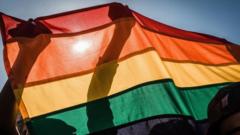Despite these concerns, the World Bank has expressed confidence in implementing "mitigation measures" that will protect and include LGBTQ communities in funded projects. This decision aligns with the organization's mission to foster equitable development and alleviate poverty worldwide. A spokesperson highlighted ongoing collaborations with the Ugandan government to introduce anti-discrimination strategies and approved new initiatives in sectors such as education and social protection.
Analysts recognize that the World Bank is a critical funding source for Uganda's infrastructure projects, with many arguing that its funding model tends to create dependency while stalling sustainable growth in developing nations. Uganda’s anti-gay legislation has drawn significant global condemnation, leading to substantial financial losses, estimated between $470 million and $1.7 billion due to halted funding. Critics claim the law serves as a diversion from pressing domestic issues like rising unemployment, while victims of the law report increased violence and discrimination against those perceived as LGBTQ.
As debates over LGBTQ rights in Africa intensify, Uganda's controversial legislation highlights the complex interplay between international finance, human rights, and local socio-cultural dynamics.
Analysts recognize that the World Bank is a critical funding source for Uganda's infrastructure projects, with many arguing that its funding model tends to create dependency while stalling sustainable growth in developing nations. Uganda’s anti-gay legislation has drawn significant global condemnation, leading to substantial financial losses, estimated between $470 million and $1.7 billion due to halted funding. Critics claim the law serves as a diversion from pressing domestic issues like rising unemployment, while victims of the law report increased violence and discrimination against those perceived as LGBTQ.
As debates over LGBTQ rights in Africa intensify, Uganda's controversial legislation highlights the complex interplay between international finance, human rights, and local socio-cultural dynamics.



















